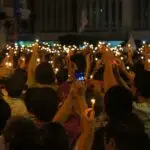International AIDS Candlelight Memorial, which takes place on the third Sunday of May, is celebrated on May 17 this year. Two of these include remembering those who have died of AIDS (acquired immune deficiency syndrome) and honoring the people who have dedicated their lives to helping those living with and affected by H.I.V. (human immunodeficiency virus). H.I.V.-positive individuals created an annual candlelight ceremony in 1983, and hundreds of events have since been held throughout the world. As a result of these events, H.I.V. awareness has increased. The memorial is also a movement to mobilize communities. It is through this memorial that the stigma and discrimination associated with the disease are addressed — now, new generations have reason to hope.
History of International AIDS Candlelight Memorial
The origin of AIDS (caused by H.I.V.) remained unknown at the time the maiden International AIDS Candlelight Memorial was being held concurrently in New York City and San Francisco in 1983. At the time, only a few thousand deaths were accounted for. The event organizers wanted to pay tribute to those who had lost their lives to AIDS and show their solidarity with those who were afflicted by it. Today, the event is still focused on that. Over 28 million people have died from AIDS since the AIDS epidemic began in 1981, and more than 42 million people are still coping with H.I.V. and AIDS.
People come to the International AIDS Candlelight Memorial to grieve loved ones who have lost their battle with AIDS. The occasion also reinforces community and national commitment to combating it as AIDS continues to affect millions around the world. This memorial has the potential to raise awareness, increase knowledge, and encourage volunteerism and fundraising in small areas. People from all walks of life who are concerned about H.I.V./AIDS come together in big cities because of it. In all circumstances, the event receives worldwide attention and creates a sense of global connection.
How people around the world commemorate the memorial is as diverse as the people themselves and takes on several forms. The memorial can be customized by each organizer or coordinator to match the unique requirements of the communities they serve. Events can be simple or elaborate — from a few friends and family members getting together to thousands marching through towns holding lighted candles, singing songs, and keeping vigil.
International AIDS Candlelight Memorial timeline
A candlelight vigil honoring those who have succumbed to AIDS is launched by those living with H.I.V.
The United Kingdom starts its first major government-sponsored nationwide AIDS awareness campaign.
The use of a highly active antiretroviral therapy (consisting of at least three types of drugs) rapidly spreads in wealthy countries.
Tens of thousands of individuals are reached by more than 900 candlelight organizers in 110 countries.
Preventing H.I.V. is made possible with the use of PrEP, which involves taking a specific H.I.V. medicine daily to reduce the risk of getting H.I.V.
International AIDS Candlelight Memorial FAQs
What should an H.I.V.-positive person do?
A person who has tested positive for H.I.V. should immediately seek medical attention. He or she should show up for routine checkups, take the medications exactly as prescribed, and take all precautions to prevent passing the virus on to others.
Is there a difference between H.I.V. and AIDS?
Yes. Anyone who has AIDS has H.I.V., but not everyone with H.I.V. will develop AIDS. AIDS is also known as “late stage H.I.V.,” which refers to the illnesses caused by untreated H.I.V. infection.
Why should pregnant women be tested for H.I.V.?
This is to significantly reduce the risk of transmitting the virus to their unborn children (should the women test positive for H.I.V.).
How to Observe International AIDS Candlelight Memorial
Attend a candlelight memorial
You can attend a candlelight memorial in your community or neighborhood. Go along with as many people as you can to pay your respects to those who have passed away because of AIDS. Don’t forget to bring your candle and comply with all protocol and safety precautions during the memorial.
Volunteer as a candlelight coordinator
A candlelight coordinator can be anyone who wants to serve and be part of the memorial. Coordinators come from a wide range of backgrounds such as doctors, nurses, teachers, students, researchers, business owners, and members of religious organizations. Health care facilities and foundations as well as universities and nonprofit organizations are likewise duly represented.
Take part in the action
Reduce the stigma associated with H.I.V./AIDS by raising public awareness and educating people about the disease. Encourage community participation in the battle against H.I.V./AIDS and help promote discourse and advocacy regarding AIDS prevention and treatment.
5 Facts About H.I.V. And AIDS
Spreads through sex or sharing needles
H.I.V. is not like the common cold or flu — it is mainly passed on through anal or vaginal sex with someone who has HIV, by sharing needles and other drug injection devices, or from a pregnant woman to her unborn child.
There are more women afflicted with AIDS
Women and girls comprise more than half of those suffering from H.I.V. around the world.
No vaccine to prevent AIDS yet
There is presently no vaccine available to prevent AIDS although scientists have been working for years to develop one.
Antiretroviral drugs can control H.I.V. infection
Although antiretroviral therapy (ART) is not a cure, it can control H.I.V. infection by reducing the amounts of the virus enabling people with H.I.V. to live long and healthy lives.
About 37.7 million people have H.I.V.
About 37.7 million people have lived with H.I.V. as of the end of 2020.
Why International AIDS Candlelight Memorial is Important
It gives us time to grieve
The event reminds us to pause, remember and say a prayer for our loved ones who have gone ahead of us because of the AIDS epidemic. The candlelight procession particularly allows us to grieve for them.
It reminds us we’re not alone
The International AIDS Candlelight Memorial brings together all sectors of society in their fight to eradicate this global epidemic. It reminds us that we’re not alone in our grief and in our efforts to prevent its spread.
Hope springs eternal
The memorial brings hope to those living with H.I.V. — that they can live normal lives if they follow all medical treatment protocols. Those with H.I.V. can take comfort in what is known as “undetectable equals untransmittable” (U=U), which means that those who maintain an undetectable viral load for at least six months cannot pass on the infection.
International AIDS Candlelight Memorial dates
| Year | Date | Day |
|---|---|---|
| 2024 | May 19 | Sunday |
| 2025 | May 18 | Sunday |
| 2026 | May 17 | Sunday |























